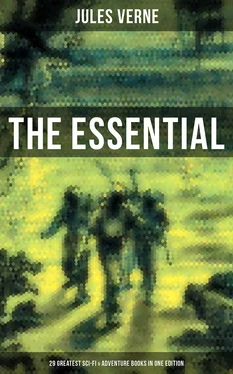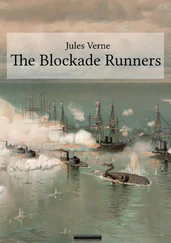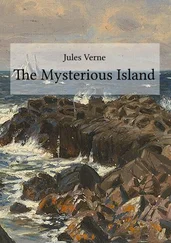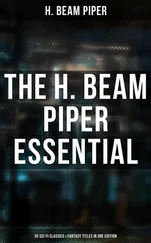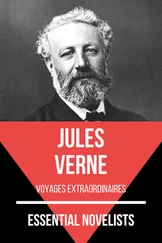It is generally known and often asserted that gunpowder was invented in the fourteenth century by the monk Schwartz, who paid for his great discovery with his life. But it is nearly proved now that this story must be ranked among the legends of the Middle Ages. Gunpowder was invented by no one; it is a direct product of Greek fire, composed, like it, of sulphur and saltpetre; only since that epoch these mixtures; which were only dissolving, have been transformed into detonating mixtures.
But if learned men know perfectly the false history of gunpowder, few people are aware of its mechanical power. Now this is necessary to be known in order to understand the importance of the question submitted to the committee.
Thus a litre of gunpowder weighs about 2 lbs.; it produces, by burning, about 400 litres of gas; this gas, liberated, and under the action of a temperature of 2,400°, occupies the space of 4,000 litres. Therefore the volume of powder is to the volume of gas produced by its deflagration as 1 to 400. The frightful force of this gas, when it is compressed into a space 4,000 times too small, may be imagined.
This is what the members of the committee knew perfectly when, the next day, they began their sitting. Major Elphinstone opened the debate.
“My dear comrades,” said the distinguished chemist, “I am going to begin with some unexceptionable figures, which will serve as a basis for our calculation. The 24-lb. cannonball, of which the Hon. J.T. Maston spoke the day before yesterday, is driven out of the cannon by 16 lbs. of powder only.”
“You are certain of your figures?” asked Barbicane.
“Absolutely certain,” answered the major. “The Armstrong cannon only uses 75 lbs. of powder for a projectile of 800 lbs., and the Rodman Columbiad only expends 160 lbs. of powder to send its half-ton bullet six miles. These facts cannot be doubted, for I found them myself in the reports of the Committee of Artillery.”
“That is certain,” answered the general.
“Well,” resumed the major, “the conclusion to be drawn from these figures is that the quantity of powder does not augment with the weight of the shot; in fact, if a shot of 24 lbs. took 16 lbs. of powder, and, in other terms, if in ordinary cannons a quantity of powder weighing two-thirds of the weight of the projectile is used, this proportion is not always necessary. Calculate, and you will see that for the shot of half a ton weight, instead of 333 lbs. of powder, this quantity has been reduced to 116 lbs. only.
“What are you driving at?” asked the president.
“The extreme of your theory, my dear major,” said J.T. Maston, “would bring you to having no powder at all, provided your shot were sufficiently heavy.”
“Friend Maston will have his joke even in the most serious things,” replied the major; “but he need not be uneasy; I shall soon propose a quantity of powder that will satisfy him. Only I wish to have it understood that during the war, and for the largest guns, the weight of the powder was reduced, after experience, to a tenth of the weight of the shot.”
“Nothing is more exact,” said Morgan; “but, before deciding the quantity of powder necessary to give the impulsion, I think it would be well to agree upon its nature.”
“We shall use a large-grained powder,” answered the major; “its deflagration is the most rapid.”
“No doubt,” replied Morgan; “but it is very brittle, and ends by damaging the chamber of the gun.”
“Certainly; but what would be bad for a gun destined for long service would not be so for our Columbiad. We run no danger of explosion, and the powder must immediately take fire to make its mechanical effect complete.”
“We might make several touchholes,” said J.T. Maston, “so as to set fire to it in several places at the same time.”
“No doubt,” answered Elphinstone, “but that would make the working of it more difficult. I therefore come back to my large-grained powder that removes these difficulties.”
“So be it,” answered the general.
“To load his Columbiad,” resumed the major, “Rodman used a powder in grains as large as chestnuts, made of willow charcoal, simply rarefied in cast-iron pans. This powder was hard and shining, left no stain on the hands, contained a great proportion of hydrogen and oxygen, deflagrated instantaneously, and, though very brittle, did not much damage the mouthpiece.”
“Well, it seems to me,” answered J.T. Maston, “that we have nothing to hesitate about, and that our choice is made.”
“Unless you prefer gold-powder,” replied the major, laughing, which provoked a threatening gesture from the steel hook of his susceptible friend.
Until then Barbicane had kept himself aloof from the discussion; he listened, and had evidently an idea. He contented himself with saying simply—
“Now, my friends, what quantity of powder do you propose?”
The three members of the Gun Club looked at one another for the space of a minute.
“Two hundred thousand pounds,” said Morgan at last.
“Five hundred thousand,” replied the major.
“Eight hundred thousand,” exclaimed J.T. Maston.
This, time Elphinstone dared not tax his colleague with exaggeration. In fact, the question was that of sending to the moon a projectile weighing 20,000 lbs., and of giving it an initial force of 2000 yards a second. A moment of silence, therefore, followed the triple proposition made by the three colleagues.
It was at last broken by President Barbicane.
“My brave comrades,” said he in a quiet tone, “I start from this principle, that the resistance of our cannon, in the given conditions, is unlimited. I shall, therefore, surprise the Honourable J.T. Maston when I tell him that he has been timid in his calculations, and I propose to double his 800,000 lbs. of powder.”
“Sixteen hundred thousand pounds!” shouted J.T. Maston, jumping out of his chair.
“Quite as much as that.”
“Then we shall have to come back to my cannon half a mile long.”
“It is evident,” said the major.
“Sixteen hundred thousand pounds of powder,” resumed the Secretary of Committee, “will occupy about a space of 22,000 cubic feet; now, as your cannon will only hold about 54,000 cubic feet, it will be half full, and the chamber will not be long enough to allow the explosion of the gas to give sufficient impulsion to your projectile.”
There was nothing to answer. J.T. Maston spoke the truth. They all looked at Barbicane.
“However,” resumed the president, “I hold to that quantity of powder. Think! 1,600,000 pounds of powder will give 6,000,000,000 litres of gas.”
“Then how is it to be done?” asked the general.
“It is very simple. We must reduce this enormous quantity of powder, keeping at the same time its mechanical power.”
“Good! By what means?”
“I will tell you,” answered Barbicane simply.
His interlocutors all looked at him.
“Nothing is easier, in fact,” he resumed, “than to bring that mass of powder to a volume four times less. You all know that curious cellular matter which constitutes the elementary tissues of vegetables?”
“Ah!” said the major, “I understand you, Barbicane.”
“This matter,” said the president, “is obtained in perfect purity in different things, especially in cotton, which is nothing but the skin of the seeds of the cotton plant. Now cotton, combined with cold nitric acid, is transformed into a substance eminently insoluble, eminently combustible, eminently explosive. Some years ago, in 1832, a French chemist, Braconnot, discovered this substance, which he called xyloidine. In 1838, another Frenchman, Pelouze, studied its different properties; and lastly, in 1846, Schonbein, professor of chemistry at Basle, proposed it as gunpowder. This powder is nitric cotton.”
Читать дальше
